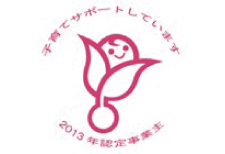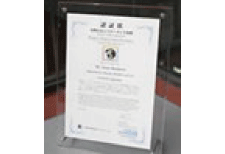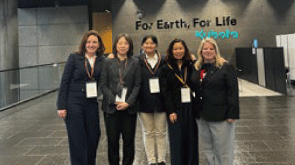DEI(Kubota Corporation)
Kubota is promoting diversity, equity, and inclusion (DEI) as a management strategy. Recognizing that there are different values and ways of thinking and bringing out the full strengths of diverse personalities leads to high value creation. As such, it is vital for the organization’s sustainable global growth. We provide work environments where individual employees, regardless of gender, nationality, age, experience, values, etc., can express their personalities and thrive. We have developed systems that make it reasonable for employees to work in a way that suits their own situation, so that they can work with enthusiasm. An inclusive culture where diversity can thrive leads to a recognition of individual abilities, experiences, and ways of thinking, and the ability to further demonstrate individual strengths.
Kubota Strives for Diversity Management that Captures the Potential of Every Individual
Kubota is a global company engaged in businesses in various regions around the world. Employees from diverse backgrounds collaborate to implement our strategy and drive business growth. We respect each person’s differences and leverage them as a strength in creating new value. The goal of Kubota’s diversity management is to transform diversity into creativity.
External Certifications and Evaluations
-
We formulated an action plan based on the “Act on Advancement of Measures to Support Raising NextGeneration Children” of the Ministry of Health, Labour and Welfare. Weobtained “Kurumin” certification in 2013.
In promoting the action plan for general business operators set out in the Act on Promotion of Women’s Participation and Advancementinthe Workplace, we have been working to dispel perceptions of fixed gender-based roles.
We carry out educational activities and provide flexible systems aimed at ensuring that our work environment is one where men are encouraged to take childcare leave.
-
We received a Gold rating in the PRIDE Index 2024, which was created bythevoluntary organization work with Pride. To ensure that our diverse human resources can demonstrate their capabilities and play an active part, we have includedsame-sex partners and commonlaw spouses where our in-house regulations refer to “spouses” so that more employees can benefit from our in-house and welfare systems.

-
As part of the D&I Awards 2024, organized by JobRainbow Co., Ltd., we were certified as a Best Workplace, an honor that is bestowed upon leading companies in the area of D&I promotion in Japan and abroad. In line with our policy on DE&I, we will harness diversity to drive creativity, and promote more motivating workplaces.

-
As a company that is a particularly strong leader in initiatives that support balancing and enabling dualcareersand co-parenting for both men and women , in FY2025 we were selectedas a member of the Next Nadeshiko: Companies Supporting Dual Careers and Co-parenting, jointly organized by the Ministry of Economy, Trade and Industry (METI) and the Tokyo Stock Exchange (TSE).

-
The Women’s Empowerment Principles (WEPs) is a set of principles jointly prepared by the UN Global Compact*1 and UN Women*2 in March 2010 to create work and social environments where women’s strengths can be leveraged in corporate activities.
The Kubota Group supports these principles and endorsed the doctrine in July 2012, thus positioning gender equality and the empowerment of women as focal points of its management and pledging to autonomously carry out initiatives.
- *1.Global initiative to achieve sustainable growth in international society announced by the UN Secretary-General at the 1999 World Economic Forum.
- *2.United Nations entity working for gender equality and the empowerment of women.
Initiatives for Fostering an Inclusive Culture
Unconscious Bias Training
Having positioned DE&I as one of its core management strategies, the Kubota Group is working to foster an inclusive culture that enables diverse human resources to play an active role. As part of this effort, we initiated Unconscious Bias Training to deepen the understanding of unconscious bias, and to enable each individual to take action. The training programs we organized in 2024 were targeted at executives and those in managerial positions. Going forward, we plan to expand eligibility for this training and conduct ongoing training.
We will also launch initiatives through which all of our employees will seek to build a workplace culture in which diverse human resources are motivated to play an active part. This will result from the efforts of each individual to recognize their own unconscious bias, become aware of this issue, and take action.
New Initiatives to Support Work-Life Balance
Introduction of Babysitting Vouchers
With the rise in dual-income households, we introduced Babysitting Vouchers, published by the Children and Families Agency, to be distributed to employees in January 2025. This initiative aims to support employees who are balancing work and childcare responsibilities. The vouchers can be used for in-home care or for transporting children to and from childcare facilities, thereby reducing the burden of childcare and allowing employees to focus on their work with peace of mind.
Establishment of Nursing Care Consultation Desk
To assist employees in balancing work and caregiving, Kubota Corporation established a nursing care consultation desk staffed by experts in April 2025. Employees can easily consult with staff regarding not only the company's internal systems but also nursing care insurance services. We have implemented a support system to help employees manage their work responsibilities while providing care for their loved ones.
Childcare Leave Support Program
This program encourages each employee to take the initiative in developing their career and engaging in open communication with their superiors. By proactively understanding and effectively utilizing both internal and public systems, we aim to support employees in achieving a balance between work and family life. Our goal is to create an environment that facilitates taking childcare leave while also fostering the development of their mid- to long-term careers.
Women Empowerment Initiatives
Women’s Empowerment Forum and Exchange meetings

Women’s Empowerment Forum
We have continuously held the Women’s Empowerment Forum since FY2023 where the company president and other members of the executive team emphasize that women’s participation is essential to Kubota and communicate directly to female employees their commitment to women’s empowerment. During the exchange meetings held following the Forum, we provide opportunities for female employees to speak directly with the executives with the aim of fostering a workplace culture in which employees aspire to selfactualization, and are motivated to play an active role.
Team Activities by the Women’s Employee Resource Group (WERG)
In the fall of 2023, we launched WERG for the purpose of encouraging interaction and mutual support among female employees. This Group has initiated activities to encourage women to break down barriers, as well as to demonstrate their full potential, by bringing female leaders together from across organizational boundaries, and by building new connections through self-driven activities. Since 2024, the 22 core members, all of whom are female managers, have interacted with other companies and conducted internal surveys. Moreover, their suggestions about improving the environment based on the knowledge they have acquired from other companies and their own experiences have led to activities that enhance the motivation of future generations, and improve the comfort of work. In FY2024, they supported the building of relationships that enable mutual support across the globe. This includes through meetings with the HR Department leaders from Kubota North America.
-

Exchange meeting
-

Exchange meeting between female managers from Kubota and Kubota North America Corporation
Developing Female Leaders

Participants of the “Global Talent Development Program”
The Global Leader program started its “Global Talent Development Program” in 2022. This training is provided to Develop Kubota’s potential global leaders and prepare them for future global roles by giving them a deeper understanding of Kubota’s core values and background, and an opportunity to apply what they have learned. Developing Kubota Leaders through the Global Leader Development Program also provides networking opportunities to discuss global challenges and solutions. The 2024 Global Leader program completed its third year after ending its final session at the Global Annual Meeting, held from January 27 to 31, 2025.
A diverse group of members from all over the world participate in the evolution of global management of the machinery business, and in its last 2024 course, the program had its most diverse group ever with participants from India, Thailand, Japan, Europe, North America and representation from other AEAN Countries. In addition there were five females that joined the program from each Region. The Global Leader program strives to find diverse candidates.
Support for Job Creation and Establishing a Work Environment for People with Disabilities
Form a New Company, Kubota Inclusion Works Co.,Ltd
Two special subsidiary companies, Kubota Works Co., Ltd. and Kubota Sun-Vege Farm Co., Ltd., merged to form the new company, Kubota Inclusion Works Co., Ltd., in January 2025.
Through this merger, we will generate synergies and further promote the employment of people with disabilities, while at the same time working to expand the exchange and development of human resources as well as the scope of work.
Hiring People with Disabilities to Support Self-Reliance
The Kubota Group is active in its initiatives towards the employment of people with disabilities that are aimed at supporting self-reliance, mainly through its special subsidiary company Kubota Inclusion Works Co., Ltd. Kubota Inclusion Works currently employs over 200 people with disabilities in cleaning, office support, and Sun-Vege operations. The company operates at various Kubota Group bases and the number of locations is also increasing. To support job creation, Kubota Inclusion Works is cooperating actively with each of our Group companies to develop operations in the areas such as mask fitting tests in production factories.
Creating an Environment Where People with Disabilities Can Participate and Demonstrate Their Abilities
We have introduced in-house training and qualification systems and encourage employees to enter Abilympics contests and to work for the qualification of skilled office cleaner.
In Abilympics contests, Kubota Inclusion Works’ employees have achieved significant results in both national and regional contests. This includes four employees ranking in the top three places in FY2024.
Our support system requires as standard the allocation of one support worker for every five people with disabilities, ensuring an environment in which each individual can demonstrate their abilities with confidence.
Contributing to Harmony and Connection with Local Communities
Kubota Sun-Vege Farm’s Kanan Farm is involved in initiatives to use hydroponic cultivation (growing plants without soil) to grow vegetables safely and securely with the goals of living in harmony with the community and the practical use of unused agricultural land. The farm’s vegetable produce is used in our company cafeterias and made available for sale to our employees. It is also sold at supermarkets in Osaka Prefecture, helping to create connections with local communities.
Going forward, by continuing to promote the participation of people with disabilities and expanding the business operations of its special subsidiaries, Kubota will work to maintain the mandatory employment ratio for people with disabilities and achieve harmony with local communities.
Deepening understanding of LGBTQ
Expanding the Definition of Spouse
At Kubota, the definition of a spouse includes "same-sex partners," allowing employees to access the company's internal systems and employee benefits programs related to life events.
Activities to Deepen Understanding
AOur training programs emphasize fundamental knowledge about sexual orientation and gender identity, empathetic communication skills for the LGBTQ+ community, and how to prevent discrimination and prejudice in the workplace. Additionally, we organize film screenings and online seminars once or twice a year to enhance understanding of LGBTQ+ issues. We also provide a consultation desk and promote "ally" activities on our internal website, ensuring that employees feel comfortable discussing their concerns and questions regarding LGBTQ+ matters.



